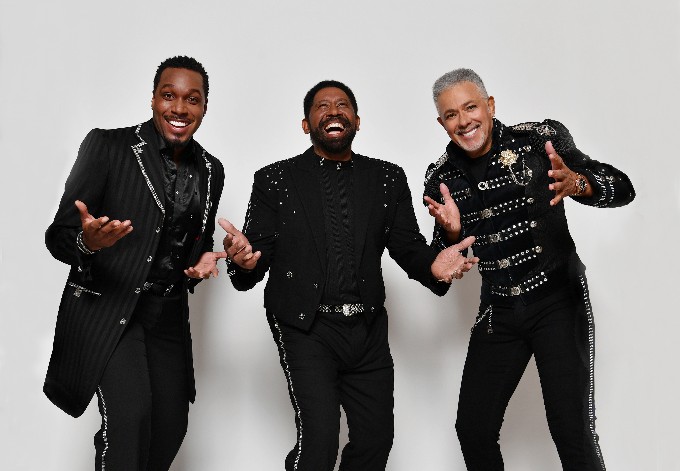The Commodores: Motown hitmakers return to Niagara

By David DeRocco dave@gobeweekly.com https://twitter.com/?lang=en
The Avalon Theatre in Niagara Falls continues to stage some of the biggest names in music history, and this week they host one of the greatest Motown/R&B/Funk hitmakers, The Commodores! Having sold over 70 million records on the strength of such songs as “Brick House,” “Machine Gun,” “Easy,” “Three Times A Lady,” and “Nightshift,” the band ruled the charts from the time of their first release in 1974. Founding member William King took time to chat with GoBeWeekly.com about their history, the joys of playing live, and the song that launched The Commodores.
GoBe: In talking to many musicians about their experiences during the COVID pandemic there seems to be a split; some took the time to relax and reenergize, some focused all their energies into creating new music or other artistic endeavors. How did you deal with the hiatus and how does it feel to back doing what you love live in front of audiences again.
WILLIAM: For me, we’ve been working for so long. We don’t usually take vacations. We’re usually on the road for four or five days a week, and we’ve been doing that for the last 15 years. For me, it was a break, a vacation in all capital letters. I had my grandkids. It was like heaven for me man.
GoBe: I know as fans we always want to see our favourite artists as often as possible. But I don’t think fans fully appreciate the toll it takes, especially on some like you who has been travelling for more than five decades.
WILLIAM: You should hear my wife talk about it. She thought it would be fun, travelling all over the world, New York, Paris, London. She came out with us and after about two weeks she said, I’m going home. For The Commodores, our normal wake up call when we’re on the road is between 2 and 4am. The reason for that is we want to catch the first plane out to where we’re going. The reason for that is, we carry 14 people on the road. And if that plane doesn’t leave for any reason, I’ve still got 14 people I have to get to the show for that day. You know how hard it is to get 14 people on a plane to replace a flight that was cancelled? We need time.
GoBe: So there are some serious logistics involved in moving this Commodore machine around.
WILLIAM: Absolutely. When you put equipment on a plane and the equipment doesn’t show up, no one at the airline knows why. No one knows where it is. So they either find it and try to get it to you in a mad panic. Or they find part of it. Then you have to search the city to try and find what you need. It can be a logistical nightmare. For us, our crew is so good. Most of them have been with us 25 or 30 years.
GoBe: I’m sure it all seems worth it once you finally step on stage. There really isn’t anything like that feeling of being in front of an audience is there?
WILLIAM: No, there’s nothing like it. I remember the first time I went on stage as headliners, Madison Square Gardens, New York. We started running out on stage, you could no longer hear the music because the crowd was so loud. We did two or three shows at the Gardens. I just looked out there and thought, wow, this is all for us. We’d been there opening for other artists, The Jackson Five, Stevie Wonder. But this time, I think I kind of froze. I was taking it in. I was absorbing as much as my brain could humanly do. I remember it to this day. I remember the silence in the midst of all that noise and then boom, I was right out it. It had such an impact on me. Then it was time to go to work and express myself on stage.
GoBe: Looking back at your history, there was a span in 1975/76 when The Commodores released 3 albums, Caught in the Act, Movin’ On and Hot on the Tracks. That kind of production is unheard of now. What was driving that kind of output?
WILLIAM: We were in our prime. We were really producing music. The thing about it all is, you’re not really paying attention to what you’re doing. You’re just doing it. You’re so eager and so hyped on what has happened previously. Things were starting to pop for us. We could hear ourselves on the radio everywhere, no matter what country we were in. That was invigorating. It made you want to do more.
GoBe: I was surprised to learn that the first single release by The Commodores was an instrumental, the tune “Machine Gun” released in 1974. Given the vocal prowess in the band that surprised me. It wasn’t uncommon in the 70s to release instrumentals. There was “Rise” by Herb Albert, “Star Wars” by Meco, ‘A Fifth of Beethoven” by Walter Murphy. What was the thought process that lead The Commodores to release an instrumental when you had so much vocal talent?
WILLIAM: Actually it was Milan Williams, our keyboardist, who I thought was a genius. Milan has just started getting into all the new electronic keyboards. He had written a song he named after his birth sign, “The Ram,” and one day he brought it in and man, it had some weird sounds. Barry Gordy heard it and said, this sounds like machine guns. It should be named Machine Gun. We told him we don’t care what you call it, just as long as he put it out to the radio stations. That became our very first hit. Motown put it out in Europe first because that whole sound had kicked off really well in Europe. When it got back here it just blew up. I remember the first time I heard that song on the radio. I was driving between Tuskegee, Alabama, and Montgomery, Alabama. I was in my little red convertible. I had the top down so it was hard to hear it. I got to a place where I could hear it better and I said, that’s “Machine Gun.” I pulled that car off the freeway and I was jumping in the car. “Machine Gun” to this day, we still it play. It was the song that launched The Commodores.
GoBe: The band has sold 70 million albums….what does that number mean to you at this stage of your career
WILLIAM: Actually, it’s more than that. It’s always hard to get the right number from the record company. Whatever they say you expect to be paid for. I always laugh at that. I keep seeing all these artists in their 70s and 80s suing their record companies now trying to get their money. But that was an accomplishment. That was a sign that you were in the big leagues, a sign that you were one of the groups doing unbelievably well. The stories people tell us of what they have done or what they’ve accomplished while our music played are second to none.
GoBe: I know the one song out of your catalogue that sends me back to my teenage years is “Brick House.” I heard it every morning at 5am as I went to rowing. Hearing it today takes me right back to being 15.
WILLIAM: That’s what music does. Music is all about time and place. Like you said, that one song takes you immediately back in time. The moment you hear the music it takes you right back. We hear it all the time. That’s what’s so great about music. We all just hope it doesn’t take you back to a bad time. It can do that too. It instantly launches memories in your head. What I love when we perform is seeing women in their 70s, they come down front and they dance like they’re 15 years old, 18 years old, back when that song was a hit. Their arms and legs are flinging, the song is taking them back to that time period. They’re having a good time, and so am I.
GoBe: You’re coming to Niagara Falls with the band. Are you still enjoying touring at this stage.
WILLIAM: To be honest, the road is hard for me now. I’ll be 75 years old soon. The travelling takes it toll on you. I’m not 25 anymore. Having said that, when I get to the edge of that stage I’m as happy as can be.
---------------------------------------------------------------------------------------------------------------
Looking for things to do in Niagara? Need Niagara event listings? Searching for Niagara’s best entertainment, music and theatre? Want to search Niagara concert listings? Before you GO out, BE informed. Log onto https://gobeweekly.com/.



